

Based upon your observations and experience in your classroom and school what are your ideas for improving mental wellness for your students? For your fellow educators? For yourself?
Responses
Frustrated
Developmentally Appropriate Curriculum INCLUDING PLAY
more social time with peers (through grade 12)
mental health workers in schools/safety for kids and staff
community involvement and consistent response/support for students, families and educators
Adults - professional autonomy and TRUST to do our jobs
principals with no less than 10 years classroom experience
updated, realistic standards for how students learn
standards as guidelines, not drivers in programs
School starting time
For educators snd students we need a shorter week of school and a later start in the day.
Doctors and clinicians state adolescents need more sleep time, yet they are not getting it due to having early start time for high schools as opposed to elementary schools. Teachers need more sleep too so we could all benefit from starting later in the day and having a 4 day school week as opposed to 5. Having more sleep time will improve attention, energy, stamina and mental clarity thus improving mental and physical well being in everyone.
Students experiencing life-changing events or at crossroads
Every case is different and unique and that is how we have to learn and accept and then deal with each individual. Like some addictions, one has to get the individual to understand what he/she is experiencing, accept it, and then there might be a possibility to help the individual. One has to want and need to make significant changes in life in order for help and healing could begin.
Read the Full ResponseReducing discipline referrals / reduction in enforcing discipline
Updated thought- The easiest way to reduce discipline referrals is not to enforce discipline
Originally I posted- Reducing discipline referrals results in a significant reduction in enforcing discipline
Actually if we build a strong relationship with the students and have the students actively engaged there really shouldn't be any discipline issues
Social Media
Parents should set controls for how much time their children spend using social media. They should also limit the types of social media their children can use. I teach 5th grade and there were too many incidences to count because of students getting their feelings hurt, being excluded or even bullied. I had to get involved to try and mend fences. Our guidance counselor and principals also had to get involved at times. I am looking forward to moving back to teaching 2nd grade next fall, because when I was there 3 years ago - no one had a cell…
Read the Full Response


